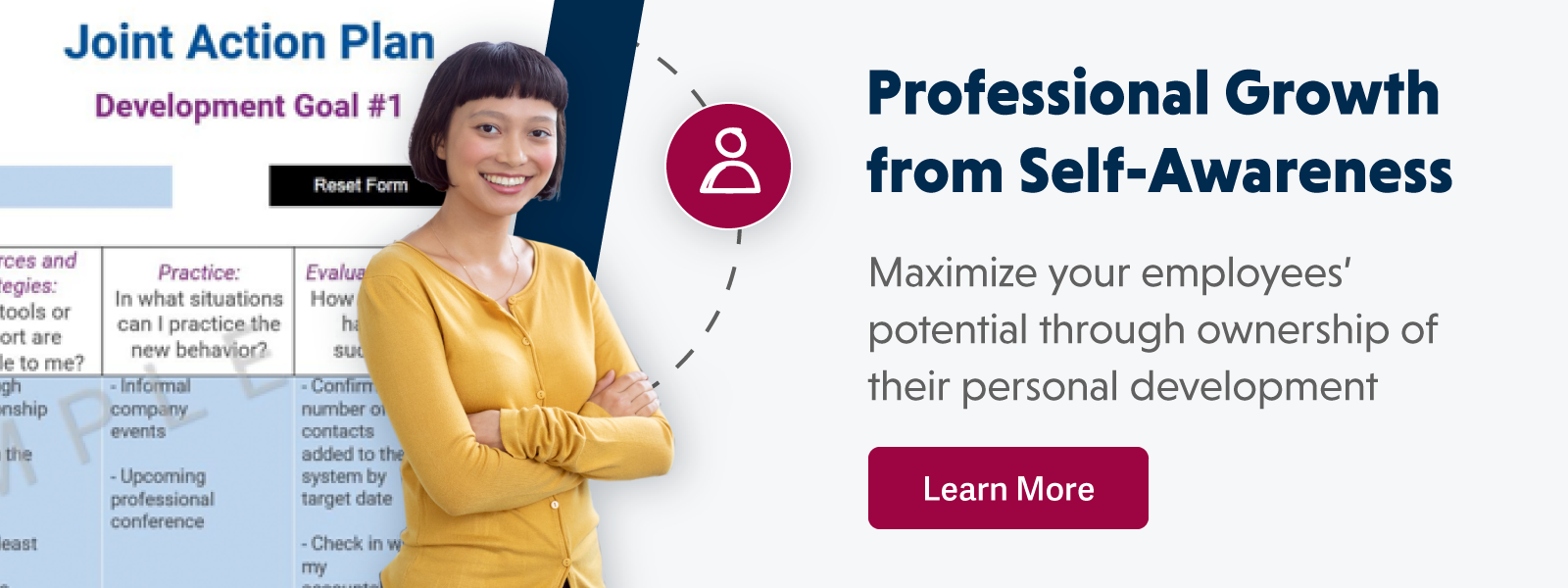We’ve been cataloging the 6 critical skills needed to build self-management in your employees. A self-managed employee is one who is motivated, high-performing, and frequently more engaged and dedicated to their work. Self-management isn’t a single skill, but rather a set of skills that can be coached and implemented through both professional coaching and development tools like the Caliper Individual Developmental Guide which can help employees take charge of their own performance and trajectory. While last time we talked about the merits of composure and self-awareness, today we’ll discuss how adaptability and professionalism contribute to self-management: Accepting the fluid nature of work and the inevitability of change, while maintaining integrity, respect, and grace amongst colleagues and in the workplace.
Adaptability
A popular conversation today is the fast-paced nature of technology and the effects of its rapid change. But what’s remained constant are the unpredictable demands of clients, consumers, and market trends and the consistent tweaks to company process, personnel, workplace policies, and job responsibilities. Part of self-management is to accept these dynamic forces as part of the job and anticipate that you’ll be asked to make changes at any time for a number of reasons from a wide variety of external factors. When an individual is too rigid to change or needs assistance as their expectations are redirected, there’s a chain of events that occurs when teammates and managers have to step in and assist the individual in navigating the necessary changes. When an individual can self-manage through periods of change, the amount of friction that results from the new circumstances is reduced, and management can focus on meeting the team’s needs.
Do you know how to develop #SelfManagement in employees? Part 2 of @CaliperCorp's 3-part series digs into the value of adaptability and professionalism to high performing self managers. Share on XKey aspects of adaptability include:
- Organization and preparedness: Forward-thinking individuals can stay organized should things need to change on a dime. Whether that means updating workflows, a change in strategy or tactics, or implementing a new tool, someone with adaptability knows where all the important parts lie, where they need to be, and how to get them there. With proper organization, any changes can be accommodated in a more timely, organized fashion — keeping any extra work that may occur to a minimum.
- Staying current: When something new comes to light, it’s for a reason. By updating your understanding, individuals gain a deeper understanding of why the change has occurred, rather than simply complying to change. What’s being removed, improved, updated, and how does it affect your outcomes? Put the change into context, and adaptability becomes easier, and the individual is more likely to accept it.
- Being proactive: Highly adaptable individuals often contribute to change proactively. Because they’re open to doing things differently, they often look for new solutions to recurring problems, try to improve inefficiencies, and look for cost-saving alternatives. Those who look ahead and anticipate future needs tend to be more willing to accept change as it occurs.
Professionalism
Professionalism isn’t just about dress codes, showing up fifteen minutes early, or addressing leadership appropriately. There are vast differences in culture from workplace to workplace, so professionalism requires a set of higher values and a personal code of ethics. Self-management includes not only performing job duties in a timely and satisfactory manner, but it also requires deliberate styles of interaction when it comes to colleagues, management, customers, and leadership. Communication is key. They treat others with respect, speak with confidence, and convey messages in the proper tone for a given setting. Professionalism means being able to adapt communication styles as needed. Things can be more casual on the company Slack channel, but pitching ideas to leadership will need to be more composed and articulated through detail and research.
Additionally, professional individuals also manage their appearance to demonstrate they value their work — though that no longer requires showing up in a suit and tie in a lot of offices. Dress codes might be losing favor, but individuals with exceptional professionalism present themselves in a way that shows they take their job seriously.
How is #professionalism tied to #SelfManagement? @CaliperCorp dives deeper into individual employee development on the blog: Share on XBut perhaps most importantly, professionalism is tied to performance. Individuals with excellent self-management take ownership of their work. They don’t pass blame or make excuses. They acknowledge where they need to improve, take feedback well, and seize opportunities for growth. They are willing to offer help to others, and are comfortable stepping outside their specific job function in order to serve the needs of their team. They’re eager to improve, are open to challenges, and while they have goals for their own career and skillsets, they also consider the greater good instead of solely on individual initiatives.
An individual’s pride in their work and ownership of work are themselves aspects of self-management, and we’ll dive more into the idea of how ownership of work and a focus on learning round out the traits that define self-management in next month’s installment. To learn more about the Individual Developmental Guide and how it helps encourage your employees to self-manage, reach out to our experts.


